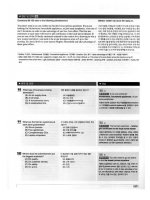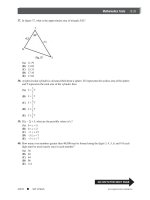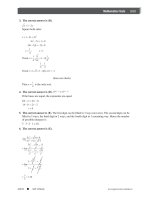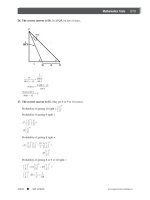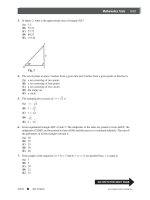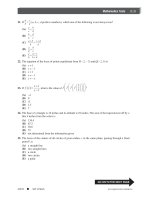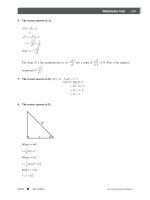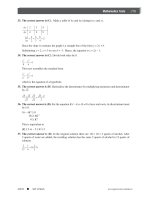SAT II Math Episode 2 Part 5 ppsx
Bạn đang xem bản rút gọn của tài liệu. Xem và tải ngay bản đầy đủ của tài liệu tại đây (643.2 KB, 20 trang )
Mathematics Tests 255
ARCO ■ SAT II Math www.petersons.com/arco
GO ON TO THE NEXT PAGE
45. The correct answer is (E).
Method 1:
To eliminate y, multiply the first equation by 3 and the second equation by
. Then add the
equations.
Method 2:
46. The correct answer is (C). A proof of this type that disproves all possible alternatives to a desired
conclusion is an indirect proof.
47. The correct answer is (D).
R {1,3,5,…17,19}
S {3,6,9,12,…15,18}
R + S = {3,9,15} 3 elements
48. The correct answer is (C). 3
2x
= 200
3
4
= 81 and 3
5
= 243
Therefore, 2x is between 4 and 5, or x is between 2 and 3.
49. The correct answer is (B). If the graph of a quadratic funciton, y = f(x), is tangent to the x-axis, the
roots of f(x) = 0 are real, equal, and rational.
50. The correct answer is (C).
VI
Part
257
ARCO ■ SAT II Math www.petersons.com/arco
THREE PRACTICE MATHEMATICS TESTS
LEVEL IIC
PRACTICE TEST I
Answer Sheet
Math Level IIC
Directions: For each question in the sample test, select the best of the answer choices and blacken
the corresponding space on this answer sheet.
Please note:
(a) You will need to use a calculator in order to answer some, though not all, of the questions in
this test. As you look at each question, you must decide whether or not you need a calculator
for the specific question. A four-function calculator is not sufficient; your calculator must be at
least a scientific calculator. Calculators that can display graphs and programmable calculators
are also permitted.
(b) Set your calculator to radian mode or degree mode depending on the requirements of the
question.
(c) All figures are accurately drawn and are intended to supply useful information for solving
the problems that they accompany. Figures are drawn to scale UNLESS it is specifically stated
that a figure is not drawn to scale. Unless otherwise indicated, all figures lie in a plane.
(d) The domain of any function f is assumed to be the set of all real numbers x for which f(x) is
a real number except when this is specified not to be the case.
(e) Use the reference data below as needed.
Part VI258
www.petersons.com/arco ARCO ■ SAT II Math
REFERENCE DATA
SOLID VOLUME OTHER
Right circular cone L = cl V = volume L = lateral area
r = radius c = circumference of base
h = height l = slant height
Sphere
S = 4πr
2
V = volume
r = radius
S = surface area
Pyramid
V = volume
B = area of base
h = height
PRACTICE TEST 1
MATH LEVEL IIC
50 Questions • Time—60 Minutes
1. The number of roots of the equation
, is
(A) 0
(B) 1
(C) 2
(D) 3
(E) ∞
2. The operation
is defined as a
b = a
b
– b
a
. What is the approximate value of ?
(A) 2.36
(B) 1.93
(C) .47
(D) –.75
(E) –1.04
3. If f(x) = 3x
2
– 5x – 4 then f(–2x) is equal to
(A) 2f(–x)
(B) –f(x)
(C) 4f(x)
(D) –4f(x)
(E) none of these
Mathematics Tests 259
ARCO ■ SAT II Math www.petersons.com/arco
GO ON TO THE NEXT PAGE
4. If P = Ke
–xt
, then x equals
(A)
(B)
(C)
(D)
(E) none of these
5. The vertices of a triangle are the intersections of the lines whose equations are y = 0, x = 3y, and
3x + y = 7. This triangle is
(A) isosceles
(B) equilateral
(C) right
(D) acute
(E) obtuse
6. The area bounded by the closed curve whose equation is x
2
– 6x + y
2
+ 8y = 0 is
(A) 12π
(B) 25π
(C) 36π
(D) 48π
(E) cannot be determined
7. The ratio of the diagonal of a cube to the diagonal of a face of the cube is
(A)
(B)
(C)
(D)
(E)
8. A regular octagon is inscribed in a circle of radius 1. Find a side of the octagon.
(A)
(B)
(C)
(D)
(E) none of these
9. Two circles of radii 3 inches and 6 inches have their centers 15 inches apart. Find the length in inches
of the common internal tangent.
(A) 8"
(B) 10"
(C) 12"
(D) 14"
(E) 15"
Part VI260
www.petersons.com/arco ARCO ■ SAT II Math
10. The graph of the equation y = 5 cos 3x has a period, in radians, of
(A)
(B)
(C) 3π
(D) 5
(E) 4
11. If 2
x
= 8
y + 1
and 9
y
= 3
x–9
then y equals
(A) 3
(B) 6
(C) 9
(D) 12
(E) 21
12. Express in terms of an inverse function the angle formed at the intesection of the diagonals of a cube.
(A) sin
–1
2/3
(B) cos
–1
2/3
(C) tan
–1
1/3
(D) sin
–1
1/3
(E) cos
–1
1/3
13. If
, for x > 0, then
(A) y varies directly with x
(B) y is independent of x
(C) y varies as the square of x
(D) (xy)
2
= 3
(E) y varies inversely with x
14. If log
r
6 = m and log
r
3 = n, then log
r
is equal to
(A)
(B) 1– m – n
(C) 1 – log
r
2
(D)
(E) 1 – m + n
15. The inequality –x
2
+ x – 10 < – 2x
2
– 4 is satisfied if
(A) x < – 3
(B) |x| < 3
(C) –3 < x < 2
(D) –2 < x < 3
(E) x < – 3 or x > 2
Mathematics Tests 261
ARCO ■ SAT II Math www.petersons.com/arco
GO ON TO THE NEXT PAGE
16. The contrapositive of the sentence ~p → q is equivalent to
(A) p → ~ q
(B) q → ~ p
(C) q → p
(D) ~ p → ~ q
(E) ~ q → p
17. A point moves so that its distance from the origin is always twice its distance from the point (3, 0). Its
locus is
(A) a circle
(B) an ellipse
(C) a hyperbola
(D) a straight line
(E) a parabola
18. The function f is defined as
.
Find the value of K so that the inverse of f will be
(A) 1
(B) 2
(C) 3
(D) 4
(E) 5
19. Find the sum of the reciprocals of the roots of the equation x
2
+ px + q = 0.
(A)
(B)
(C)
(D)
(E) p + q
20. A cube 4 inches on each side is painted red and cut into 64 1-inch cubes. How many 1-inch cubes are
painted red on two faces only?
(A) 8
(B) 12
(C) 16
(D) 24
(E) 32
Part VI262
www.petersons.com/arco ARCO ■ SAT II Math
21. The set {x/| x – L|< K} is the same for all K > 0 and for all L, as
(A) {x/0 < x < L + K}
(B) {x/L – K < x < L + K}
(C) {x/|L – K| < x <|L + K|}
(D) {x/|L – x| > K}
(E) {x/ – K < x < L}
22. Write
in the form a + bi.
(A)
(B)
(C)
(D)
(E)
23. What is the approximate magnitude of 8 + 4i?
(A) 4.15
(B) 8.94
(C) 12.00
(D) 18.64
(E) 32.00
24.
is equivalent to
(A) 2 sin A
(B) 2 sec A
(C) 2 cos A
(D) 2 csc A
(E) 2 tan A
25. Find the coordinates of the center of a circle whose equation is x
2
+ y
2
– 4x – 2y = 75.
(A) (4, 1)
(B) (1, 4)
(C) (2, 1)
(D) (1, 2)
(E) (3, 1)
Mathematics Tests 263
ARCO ■ SAT II Math www.petersons.com/arco
GO ON TO THE NEXT PAGE
26. From two ships due east of a lighthouse and in line with its foot, the angles of elevation of the top of
the lighthouse are x and y, with x > y. The distance between the ships is m. The distance from the
lighthouse to the nearer ship is
(A)
(B)
(C)
(D) m cot x sin y
(E) m sec x cos y
27. What is the probability of getting 80% or more of the questions correct on a 10-question true-false
exam merely by guessing?
(A)
(B)
(C)
(D)
(E)
28. The expression is equivalent to
(A)
(B)
(C)
(D)
(E) 15 – 8i
29. Evaluate
.
(A) 0
(B) 1
(C) 2
(D) 3
(E) ∞
Part VI264
www.petersons.com/arco ARCO ■ SAT II Math
30. If w = w
0
e
–kt
, find the approximate value of t when w = 7, w
0
= 50, and k = 3.4.
(A) .52
(B) .54
(C) .56
(D) .58
(E) .60
31. Find the cube root of 27 (cos 30° + i sin 30°) that, when represented graphically, lies in the second
quadrant.
(A) 3 (cos 10° + i sin 10°)
(B) 3 (cos 170° + i sin 170°)
(C) 3 (cos 100° + i sin 100°)
(D) 3 (cos 130° + i sin 130°)
(E) 3 (cos 150° + i sin 150°)
32. If
, find the value of 2 cos π sin (π – y) sin .
(A)
(B)
(C)
(D)
(E)
33. Figure 33 is a graph of which of the following?
(A) x
2
+ y
2
= 9
(B) |x| = 3 and |y| = 3
(C) |x + y| = 3
(D) |x| + |y| = 3
(E) x – y = 3
Fig. 33
Mathematics Tests 265
ARCO ■ SAT II Math www.petersons.com/arco
GO ON TO THE NEXT PAGE
34. What is the degree measure of the second quadrant angle
θ
for which 8 sin
2
θ
+ 6 sin
θ
= 9?
(A) 48.6°
(B) 101.6°
(C) 121.4°
(D) 131.4°
(E) 172.8°
35. Find the set of values satisfying the inequality
.
(A) 4 < x < 16
(B) – 4 > x > – 16
(C) 4 > x > – 16
(D) x < 16
(E) x > 4
36. If the circle (x – 1)
2
+ (y – 3)
2
= r
2
is tangent to the line 5x + 12y = 60, the value of r is
(A)
(B)
(C)
(D)
(E)
37. In a coordinate system in which the y-axis is inclined 60° to the positive x-axis, find the distance PQ
between the points P(–3, 7) and Q(6, –5).
(A)
(B) 15
(C)
(D)
(E)
38. What is the remainder when 3x
4
– 2x
3
+ 3x
2
– 2x + 1 is divided by x – 3?
(A) 70
(B) 102
(C) 200
(D) 211
(E) 241
39. For what positive value(s) of K will the graph of the equation 2x + y = K be tangent to the graph of the
equation x
2
+ y
2
= 45?
(A) 5
(B) 10
(C) 15
(C) 20
(E) 25
Part VI266
www.petersons.com/arco ARCO ■ SAT II Math
40. What positive value(s) of x, less than 360º, will give a minimum value for 4 – 2 sin x cos x?
(A)
(B)
(C)
(D)
(E)
41. Express in radians the period of the graph of the equation .
(A)
(B) π
(C)
(D) 2π
(E) 3π
42. For what value of m is 4x
2
+ 8xy + my
2
= 9 the equation of a pair of straight lines?
(A) 0
(B) 1
(C)
(D)
(E) 4
43. Two roots of the equation 4x
3
– px
2
+ qx – 2p = 0 are 4 and 7. What is the third root?
(A)
(B)
(C) 11
(D)
(E)
Mathematics Tests 267
ARCO ■ SAT II Math www.petersons.com/arco
GO ON TO THE NEXT PAGE
44. In figure 44, what is the approximate area of parallelogram DAWN?
(A) 11.57
(B) 13.64
(C) 14.63
(D) 17.25
(E) 20.00
45. If log
6.2
x = e, what is the approximate value of x?
(A) 142.54
(B) 173.82
(C) 227.31
(D) 386.42
(E) 492.75
46. If x = 1 – e
t
and y = 1 + e
–t
, find y in terms of x.
(A) y = x
(B) y = 1 – x
(C)
(D)
(E)
47. Find the value of log
8
( ).
(A)
(B)
(C)
(D)
(E)
Fig. 44
Part VI268
www.petersons.com/arco ARCO ■ SAT II Math
48. If two sides of a parallelogram are 6 and 8 and one diagonal is 7, what is the length of the other diagonal?
(A)
(B)
(C)
(D)
(E) 9
49. When 5x
13
+ 3x
10
– K is divided by x + 1, the remainder is 20. The value of K is
(A) –22
(B) –12
(C) 8
(D) 28
(E) 14
50. What is the smallest possible value of x (in degrees) for which cos x – sin
?
(A) 5°
(B) 12°
(C) 15°
(D) 18°
(E) 30°
STOP
IF YOU FINISH BEFORE TIME IS CALLED, YOU MAY CHECK YOUR WORK ON THIS
TEST ONLY. DO NOT WORK ON ANY OTHER TEST IN THIS BOOK.
Mathematics Tests 269
ARCO ■ SAT II Math www.petersons.com/arco
GO ON TO THE NEXT PAGE
PRACTICE TEST I
Answer Key
Math Level IIC
SOLUTIONS
1. The correct answer is (B).
So there is only 1 root.
2. The correct answer is (E).
1. B
2. E
3. E
4. D
5. C
6. B
7. B
8. D
9. C
10. A
11. B
12. E
13. E
14. E
15. C
16. E
17. A
18. B
19. A
20. D
21. B
22. E
23. B
24. D
25. C
26. B
27. E
28. C
29. D
30. D
31. D
32. C
33. D
34. D
35. A
36. B
37. A
38. D
39. C
40. E
41. B
42. E
43. B
44. C
45. A
46. E
47. C
48. D
49. A
50. C
Part VI270
www.petersons.com/arco ARCO ■ SAT II Math
3. The correct answer is (E).
This is not a multiple of the original function
4. The correct answer is (D).
5. The correct answer is (C). Slope of x = 3y is 1/3.
Slope of y = – 3x + 7 is –3. Hence, since slopes are negative reciprocals, the lines are ⊥, and the ∆ is right.
6. The correct answer is (B).
Curve is circle of radius 5.
Hence, area is 25π.
7. The correct answer is (B).
Mathematics Tests 271
ARCO ■ SAT II Math www.petersons.com/arco
GO ON TO THE NEXT PAGE
8. The correct answer is (D). Using the law of cosines:
9. The correct answer is (C).
Extend OT 3″ to T′ and draw O′T′.
Then in right ∆ OT′O′, OO′ = 15″
and OT′ = 9″ so that O′T′ = 12″.
10. The correct answer is (A). The cosine function y = cos x has a period of 2π radians.
Hence y = 5 cos 3x has a period of
radians.
11. The correct answer is (B).
Part VI272
www.petersons.com/arco ARCO ■ SAT II Math
12. The correct answer is (E).
Let each edge =1
PQRS is a rectangle
13. The correct answer is (E).
y varies inversely with x.
14. The correct answer is (E).
Mathematics Tests 273
ARCO ■ SAT II Math www.petersons.com/arco
GO ON TO THE NEXT PAGE
15. The correct answer is (C).
16. The correct answer is (E). The contrapositive is the converse of the inverse. Thus, form the converse
and negate the hypothesis and conclusion. Hence ~ q → p.
17. The correct answer is (A).
18. The correct answer is (B). Solve for x in terms of y:
Now interchange x and y.
Hence K = 2.
19. The correct answer is (A). Let the roots be r and s.
Then r + s = – p and rs = q.
20. The correct answer is (D). A 1-inch cube will be painted on two sides only if it lies on one edge of
the 4-inch cube but does not touch a vertex of the original cube. On each edge there are two such
cubes. Since a cube has 12 edges, there are 24 such cubes.
21. The correct answer is (B). If x > L, then |x – L| < K means x – L < K or x < L + K
If x < L, then |x – L| < K means L – x < K
or –x < K – L or x > L – K
so that L – K < x < L + K
Part VI274
www.petersons.com/arco ARCO ■ SAT II Math
22. The correct answer is (E). By De Moivre’s Theorem,
23. The correct answer is (B).
24. The correct answer is (D).
25. The correct answer is (C).
Center is at (2, 1).

